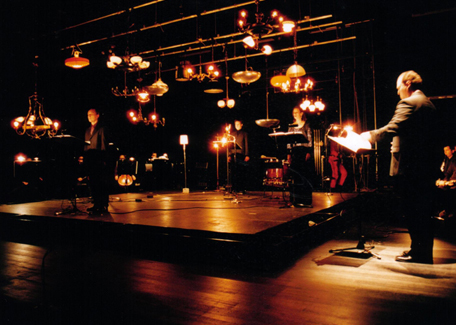DIRECTOR
> THEATRE | MUSICAL THEATRE | OPERA | SPECIAL PROJECTS
La Gabbia (La Jaula)
(2004)
In the castle’s cellar there is a deserted room, where the count’s father used to torture unfaithful servants. After dinner, in compliance with her curiosity, the count brings his wife in the torture’s room…
Because of his cold behaviour the superintendent is suspected of being the devil: for vanity the countess tries to attract his attention. When finally she gives in to his now burning desire, she asks him in exchange eternal life, keeping her beauty forever. The count has seen everything.
In the castle’s cellar there is a deserted room, where the count’s father used to torture unfaithful servants. After dinner, in compliance with her curiosity, the count brings his wife in the torture’s room and forces her into a small cage with the intention to leave her there overnight.
Just the same night the castle was attacked and destroyed, the count murdered by his enemies.
The opera ends in the dreadful doubt whether the countess dies in the cage or the superintendent is really the devil, and then she will stay in the cage for all eternity.
Tiziano Manca
-
La Gabbia (The cage)
Opera in one act -
Music
Tiziano Manca -
Libretto
Alejandro Tantanian
(Translated to Italian and adapted by the composer)
with
Neue Vocalsolisten Stuttgart:The Countess
Stephanie Field, mezzosoprano -
The Count
Martin Nagy¸ tenor -
The Superintendent
Daniel Gloger, countertenor -
His double
Andreas Fischer, bassNewEars.ensemble:
Dirk Altmann, clarinet
Nicola Miorada, clarinet / bass clarinet
Boris Müller, percussion
Simona Riniker, violin
Paul Pesthy, viola
Eric Borgir, cello
Florian Hölscher, piano -
Set, costumes and lights
Oria Puppo -
Stage direction
Alejandro Tantanian -
La Gabbia is a coproduction between Akademie Schloss Solitude, Stuttgart; Musik der Jahrhunderte, Stuttgart; Lille 2004 – European Cultural Capital and Opera de Lille.
Running time: 45 minutes.
-
World premiere: March 30th, 2004, Theaterhaus, Stuttgart, Germany
Further presentations:
April 2004: Opera de Lille, France -
